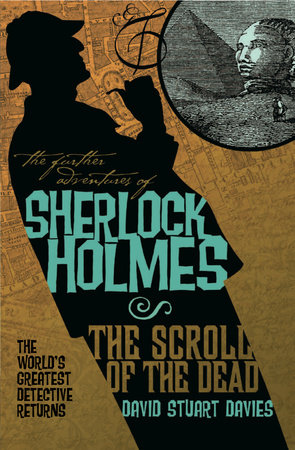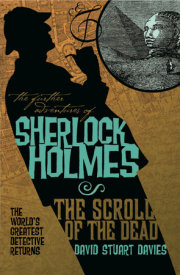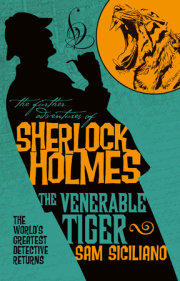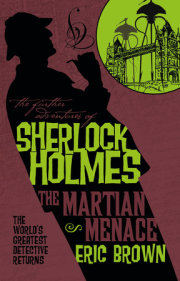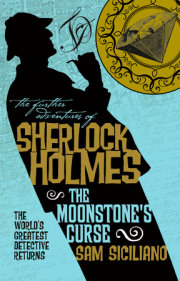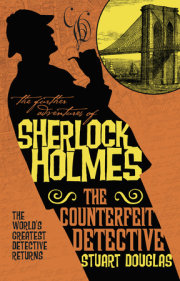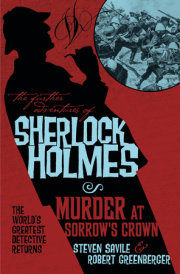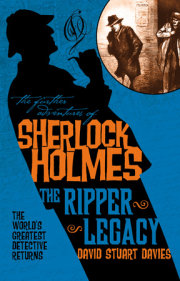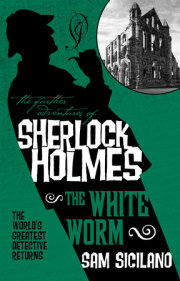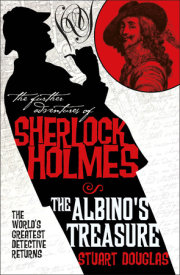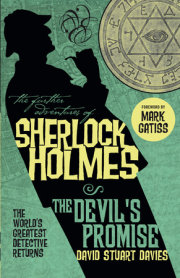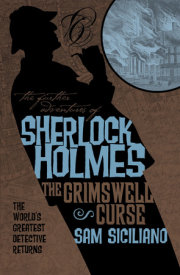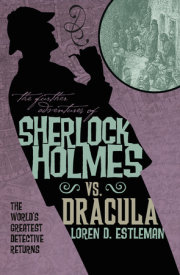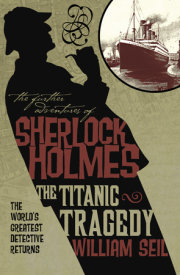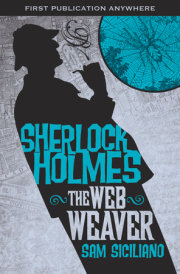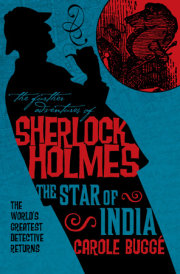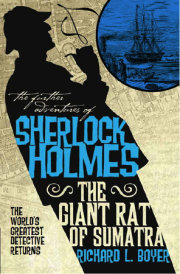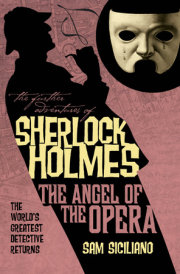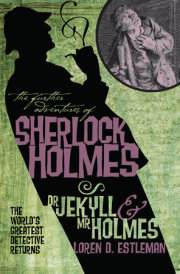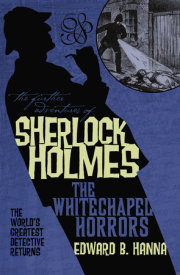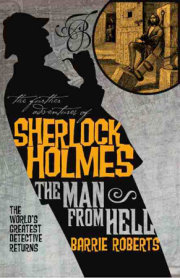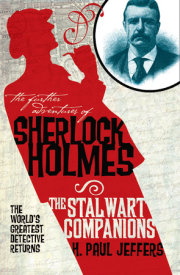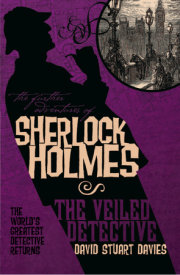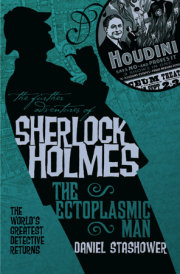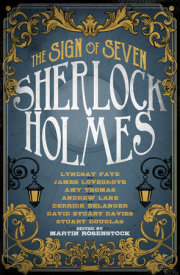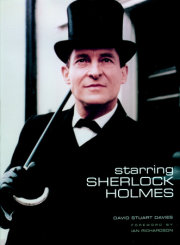Chapter I - An Inspector CallsIt has often been said - indeed, I have been one of those who have said it - that Sherlock Holmes, the famous consulting detective, was
the champion of law and order of his age. However, on reflection, I can state that this is only partly true. Crime did indeed fascinate Holmes, but when it came to the solving of it, he was very selective. I have been present when he has rejected numerous pleas and entreaties to tackle a particular mystery solely on the basis that it was simply not interesting enough. The misdemeanours that intrigued my capricious friend had to bear the hallmark of the
recherché before he would contemplate involving himself in providing a solution. He loved detective work for its own sake, but the detective work had to pose an unusual conundrum or it presented no challenge.So it was in the spring of 1896 when, after a very fallow period, he devoured news of criminal activity reported in the daily press in the hope of spotting some intriguing puzzle to satisfy his needs. I would aid him every morning in this pursuit by pointing out what I regarded to be crimes of intellectual interest.“What you may consider stimulating to the deductive brain, Watson, falls far short of my ideal,” he would comment disparagingly. “Music hall artiste strangled in dressing room poses no cerebral challenge whatsoever. A case of jealousy and intoxication. No doubt even the Scotland Yarders could cope with that one in a day!”“Have you seen the report in the
Chronicle of the murder of Sir George Faversham, the noted archaeologist?”Holmes took his pipe from his mouth and paused. “Items stolen from the family home?”“Nothing of real value taken.”“Ah,” he scoffed. “Common burglary with homicidal consequences.”I threw down the paper. “I give up,” I cried. “There is obviously nothing that will satisfy you.”Holmes gave me a weak grin. “Well, at least we are agreed on that point.” His eyes wandered to the drawer in his bureau where I knew he still kept the neat Morocco case containing the hypodermic syringe.“And that is not the answer either,” I snapped.For a moment Holmes looked surprised, and then a dreamy smile touched his countenance. He realised that I was playing him at his own game by reading his thoughts. The idea amused him so much that he burst out with a roar of laughter. His hilarity was so contagious that soon I was laughing along with him. So enwrapped were we in our own amusement that we failed to take notice of the insistent knock at our sitting room door. Moments later, it opened hesitantly and Inspector Hardcastle of the Yard stood on our threshold. Holmes had worked with Hardcastle on a couple of investigations in the past, notably the disappearing Chinese laundry affair. He was a dour Yorkshireman who was methodical and thorough, rather than inspired, in his police work. He appeared most discomfited by our abandoned behaviour.“If I have called at an inconvenient moment, gentlemen…” he said, bristling somewhat, unsure whether he was the cause of our amusement.“Not at all, Hardcastle,” cried my friend, still chortling. “It is always a pleasure to receive a visit from one of my friends in the official force.” He waved the Scotland Yarder to a chair. “Sit down, my dear fellow, and don't look so disheartened. Weeks of inactivity have lightened my brain. You are indeed a sight for sore eyes, especially if you have a case for us.”The inspector, uncertainly still clouding his features, did as he was bidden. He was a tall, beefy man whose great oval face was beset with large, grey, mournful eyes and a broken nose. His black hair, plastered with cream, looked as though it had just dropped on his head. Clutching his bowler tightly in his large hands, he sat awkwardly in the chair opposite us.“You
do have a case for us?” enquired Holmes languidly, his mood changing rapidly.“Something I though might interest you,” said Hardcastle, his equilibrium still not restored.“I hope it's not something already reported in the papers,” observed Holmes, relighting his pipe with a glowing cinder from the fire. “It's not the strangled magician at Henty's Music Hall?'“It most certainly is not,” snapped Hardcastle indignantly. “Young Kingsley is on that case. I put my money on Roland Reilly, the 'Irish Vagabond with a Voice of Gold'.”“I am sure you are right. I have heard that when in drink he was a towering rage. In the confined world of the music hall artiste, the smallest slights and petty jealousy become magnified beyond all reason. I wonder that there isn't a blood bath every night.”Hardcastle looked curiously at my friend, striving to ascertain whether Holmes was being serious or still gently teasing him.“Come, come,” said Holmes, spinning his hand as a conductor might to increase the speed of the music, “let us hear about your case, Hardcastle.”“There has been a break-in at the British Museum.”“Is that all?” groaned Holmes, slumping back in the chair.“There's more to it than that.”“There had better be. What was stolen: some mediaeval pottery, or some gewgaws belonging to Henry VIII, perhaps?”“I'll come to that in a moment. It was a very professional job. A two man operation.”“How do you know?”The Inspector's face lit up. “Because they were foolish enough to leave clues behind, Mr Holmes. We found two sets of muddy footprints near the scene of the crime and, before you ask, they could not have been anyone else's because the floor is mopped clean after closing time.”Holmes held his hands in mock surrender. “Two men it is then, Hardcastle.”“The crib-cracker and the expert, I should guess.”“Expert?” I asked.“Yes, Doctor Watson. Whoever it was knew exactly what he wanted. He had the whole ruddy museum to go at and just the one thing was taken.”Holmes leaned forward a little, interested now. “What was that one thing?”“Some papyrus document - a scroll, I think.”“Ah, from the Egyptology room.”“That's right. Full of those old mummies and dog-headed statues and the like.”“And,” said Holmes “various gold trinkets and other very precious
objets d'art which would have been far easier and more profitable to dispose of than a crumbling old document.”“Precisely, Mr. Holmes.”“Well, Watson, what does this suggest to you?”“A collector. The item to be added to his private collection, for his own personal viewing.”My friend beamed. “A very determined collector.”“More determined than you'd think,” said Hardcastle. “Determined enough to kill for the booty.”“Who?”“The night security guard.”“How?”“Shot in the head at point blank range.”“Really.”“With a Derringer pistol.”“How can you be so sure?” I asked.In answer, Hardcastle fumbled in his pocket and pulled out a dark velvet bag fastened with a draw-string at the top. Opening the bag, he allowed the contents to slip onto the small table by Holmes. It was a small silver Derringer pistol which sparkled in the firelight. “The murderer dropped it while making his escape.”“Careless of him,” said Holmes, taking a long-stemmed clay pipe from the rack on the mantelpiece. Slipping the stem through the trigger guard, he lifted up the pistol to examine it. “An expensive weapon… chased silver… a recent purchase…” He murmured these comments more to himself than to us.“I remembered about your own system for checking fingerprints, Mr. Holmes, Mr Holmes,” said Hardcastle eagerly. “That's how you managed to lay a trap for Fu Wong, but I reckon you won't find any on that gun.”“Of course not. This fellow would have worn gloves.” He sniffed the weapon, which had a finely-tooled brown leather grip, and then examined the barrel. “Fired just the once. Not the kind of firearm usually associated with burglary and the class of crib-crackers we've encountered before, eh, Watson?”“It's a ladies' gun,” I sniffed.“But it does a man's job.” Holmes took it over to the window and, retrieving his lens from the bureau, scrutinised the Derringer closely. At length he returned to his chair. Slipping the pistol into the velvet bag, he handed it back to the inspector.“Anything, Mr. Holmes?”Holmes pursed his lips and shook his head. “Very little. The owner is youngish man with blond hair, has expensive tastes, is somewhat extravagant in nature, is arrogant, and extremely confident. And he is probably mentally unstable.”The inspector's eyes widened. “How on earth do you reach those conclusions?”“A fine blond hair caught in the trigger guard gives me the colouring and the age, and there is the faint aroma of gentlemen's
eau de toilette still lingering about the leather grip. The owner obviously handled the weapon while his fingers were still moist with the perfume and it has soaked into the crevices of the tooled leather. For so persistent an aroma to remain, this particular fragrance could not have been purchased for less than fifty shillings a bottle, which indicates both the expensive taste and the extravagant nature. The fact that there was only one bullet in the gun suggests our young villain was supremely confident that only one bullet was required for the deed. That smacks of remarkable arrogance also. The probability that this fellow adorned himself with expensive
eau de toilette before going out to commit a horrid crime implies that he views murder almost as a social event - which suggests to me a certain element of mental instability.”“Extraordinary,” murmured Hardcastle. I was unsure whether he was referring to Holmes's ability to fill in so many details about the murderer from a brief examination of his gun or to the character of the killer as my friend had described him.“Those few details may be of assistance as the case progresses, but at present they do not get us very far. I suspect that the real help will come from discovering more about the nature of the item that was stolen.”Hardcastle appeared unconvinced. “As I said, Mr. Holmes: it was just some old papyrus document covered with ancient writing.”“Hieroglyphics,” I said.The policeman's face crumpled with distaste. “So I gather, Doctor. I must admit I'm much more at home with the theft of a plate, stolen gems, or a straightforward shoot 'em or stab 'em murder case.”Holmes's eyes sparkled mischievously. “And it has taken you approximately forty-eight hours to discover that you are out of your depth in the matter. Ah, don't deny it, Inspector. The deterioration of the cordite in the gun-barrel tells me that it is some two or three days since it was fired; and, quite honestly, old chap, the depth of the furrows on your brow speaks of a weary problem, one that has been with you for several days and not one that has been thrust upon you overnight. It is Monday morning now. I should estimate that the robbery took place on Friday night. Am I correct?”Hardcastle nodded dumbly.“But there has been no mention in the press of the crime,” said I.“We managed to keep it out of the papers,” Hardcastle replied. “We needed the time to check up on the various dealers who handle this kind of specialised merchandise before the press got wind of it.”“'Dusty' Robinson and his ilk?'The inspector nodded. “That's right, Mr. Holmes. We followed up all the known leads both in and out of the Rogues' Gallery, but we hit a brick wall with all of 'em.”“How valuable is this document?” I asked.Hardcastle shrugged. “They can't really put a price on it. To you or me, Doctor, it would be pretty worthless, but to a connoisseur of these kinds of things, it's priceless.” Suddenly the policeman strained forward, his face twisting into a pained grimace as though he were suffering from acute toothache. “To be honest with you, this is beyond me, Mr. Holmes. I do hope you can see your way to shedding some light on the matter.”“Delighted to Hardcastle,' said Holmes, throwing me a sidelong glance. “You know I'm always happy to assist the official force whenever I am able.”The policeman beamed and his body visibly relaxed. “That's wonderful,” he said. “I have a cab waiting. If you'd be so good, we can go round to the British Museum now. Sir Charles Pargetter, the Curator of the Egyptology section, can explain to you all about this blasted papyrus.”“Excellent,” cried Holmes, flinging off his dressing gown. “Are you game, Watson?”“Certainly.”“Then, my dear fellow, collect your coat, hat, and stick and we shall accompany our friend here to the British Museum!”
Copyright © 2009 by David Stuart Davies. All rights reserved. No part of this excerpt may be reproduced or reprinted without permission in writing from the publisher.

